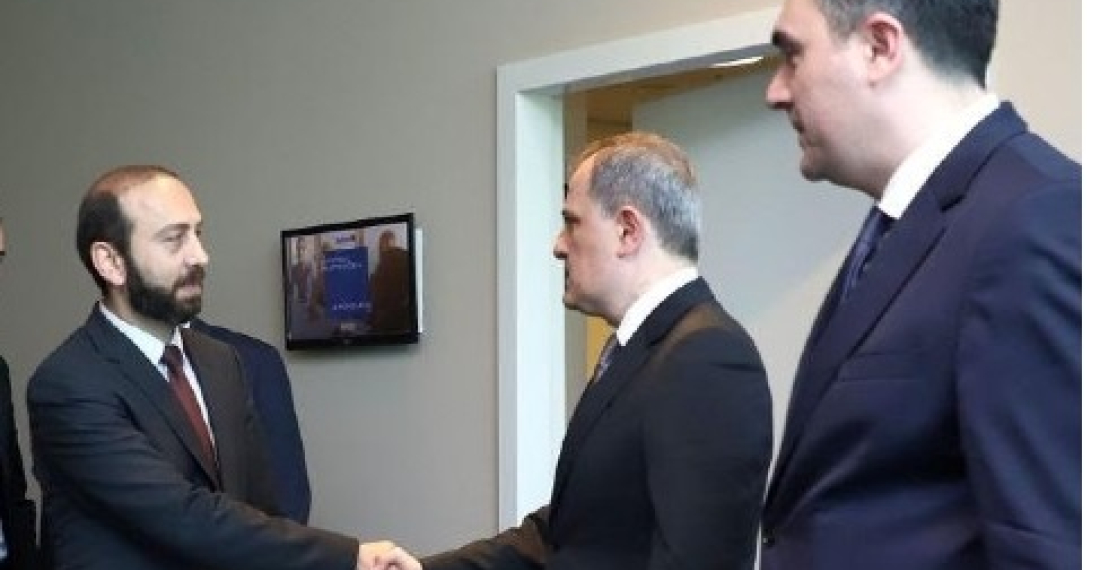On 8 October, Azerbaijani President Ilham Aliyev traveled to Tbilisi to meet with his Georgian counterpart, Irakli Garibashvili. The unannounced meeting concerned regional projects such as a new Black Sea port in Anaklia and the Middle Corridor that will stretch from China to Europe via Central Asia and the South Caucasus. Both leaders expressed a desire to bring peace to their shared but troubled region while Aliyev surprised many by offering to "immediately" launch talks between Armenia and Azerbaijan in Georgia.
It was unclear what Aliyev meant by this, though he did refer to bilateral and trilateral talks, the latter presumably involving Georgia. It was also unclear whether Aliyev was referring to a meeting of the leaders, though he did arguably imply such talks will be at various official levels and didn’t make any direct reference to meeting face-to-face with Pashinyan. “Baku does not see the need to discuss the problems of the region with countries far from the region,” Aliev proclaimed. “Baku believes that these issues can be discussed and resolved in a regional framework.”
Nonetheless, in a televised interview broadcast on Armenian Public TV two days later, it appeared that the Armenian Prime Minister dismissed the invitation or at least laid down his own terms.
“When Azerbaijan now offers another platform, we must understand that we are not against other dialogues, but we are against the revisionism of principles already adopted at other meetings,” he said before then being asked about an already existing regional platform – the 3+3 that seeks to bring Armenia, Azerbaijan, and Georgia together in a format with the regional powers of Iran, Russia, and Turkiye. Pashinyan also said that there was an agreement to hold the next 3+3 in Iran.
The Tehran meeting had been expected many times since its first and until now only meeting held in Moscow in December 2021 at the level of deputy foreign ministers. However, Georgia refused to take part because of Russian involvement. On 23 October, official confirmation came that it would take place, but that Tbilisi would again not attend, though surprisingly Yerevan would. This despite pulling out of a possible trilateral meeting of the Armenian, Azerbaijani, and Russian foreign ministers in Bishkek earlier this month.
Moreover, the 3+3 format would now be at the level of the foreign ministers. Also of significance, though Pashinyan said that it would not include matters discussed in other formats, Iran’s Ambassador to Russia said that it would focus on regional peace, stability, and security.
Though Pashinyan’s concerns about the emergence of yet another format of talks are understandable, existing talks over an agreement between the Armenian and Azerbaijani foreign ministers seem bilateral in nature. They appear to represent the heavy lifting for the text of any agreement to normalise relations. Indeed, the talks in the U.S. have been in that format with U.S. Secretary of State Antony Blinken taking a more facilitating rather than mediating role.
The same was true for the U.S. and EU meeting between Mirzoyan and his Azerbaijani counterpart, Jeyhun Bayramov, on 2 October 2022 in Geneva. Besides, in July last year, Georgian foreign minister Ilia Darchiashvili also facilitated a meeting between his two regional counterparts in Tbilisi. And in June 2021, Garibashvili was involved in international mediation efforts to organise the return of 15 prisoners-of-war held by Azerbaijan in exchange for landmine maps.
All this in addition to Georgia being the main venue for Track II meetings between Armenian and Azerbaijani civil society for decades. Of course, there are many reasons why Yerevan is skeptical of Tbilisi’s potential role in the process given its military and economic ties to Azerbaijan and Turkiye, but it would at least be much easier to organise more frequent meetings at all levels by holding them nearby. This remains a fundamental flaw in both the EU and US processes.
But despite Yerevan’s hesitancy, and whether before or after any peace agreement, the potential role of Tbilisi has resurfaced again, as has that of the region in general, especially as, with or without Georgia, another regional format – 3+3 – appears to have been resurrected. Meanwhile, preparations continue for Charles Michel-facilitated talks in Brussels possibly at the end of the month, but the opportunity to hold meetings in Tbilisi should not be dismissed lest Georgia remain excluded.
Regional gatherings and structures should not be ignored in order to foster closer regional cooperation and communication without external interference. Moreover, while geopolitics rages after Ukraine and now Gaza, and with the US about to be further distracted by its own elections, it is time to support this new format in case others break down or are obstructed in the future.
There are already encouraging signs. At the Fourth International Silk Road Forum to be held in Tbilisi on 26-27 October, both Armenian Prime Minister Nikol Pashinyan and Azerbaijani Prime Minister Ali Asadov will make opening addresses in the official opening ceremony led by their Georgian counterpart, Irakli Garibashvili. Though this is not exactly the bilateral and trilateral meetings Aliyev might have been referring to, this unprecedented development could well be a first step.
After all, the future of the region does indeed lie in the region, and while such developments should be both applauded and encouraged – with or without a peace agreement – it is imperative that they are not viewed as a way to disrupt any progress made through already established and functioning formats to resolve the three decades-long conflict. They will anyway need external support and it should be remembered that it is just as important that they are not isolated from the wider international context too.







